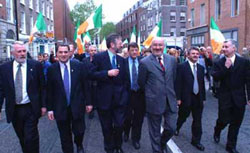 |
Irisch
Republikanische Solidarität
|
 |
Joint Declaration should be implemented - Ahern
On Thursday -- following the announcement of the cancellation of
Assembly elections -- the British government released the
governments' joint declaration on the implementation of the 1998
Good Friday Agreement, including measures on policing,
demilitarisation, the stability of the institutions and other
outstanding issues.
Sinn Fein President Gerry Adams said he welcomed the publication
of the British and Irish governments' joint declaration.
But he pointed out that this was 'not in itself an act of
completion, but outlines a process that could lead to an act of
completion'.
The declaration contains proposed reforms on policing, justice,
equality and the stability of the North's political institutions.
Some elements of the Joint Declaration are conditional on an
unspecified "historic leap forward by the IRA", partuclarly
those
relating to security and the British government's powers to to
suspend the Belfast Asssembly.
But there are many less contentious proposals concerning equality
and rights, the regeneration of disadvantaged areas, financial
support for Irish- language film and television production for
which no rationale is advanced for their unimplementation.
Among the more controversial elements included in the deal was a
proposal for an independent monitoring body to assess and report
on "paramilitary activity" .
The body would have been responsible for monitoring and reporting
on claims that parties in the powersharing Assembly were in
breach of their commitments to the Agreement.
The introduction of sanctions against parties flouting the
Agreement was demanded by Ulster Unionists.
The legislation underpinning the Good Friday Agreement would have
been changed to allow for the exclusion of political parties
found to be in breach -- in practice, this was intended for use
against Sinn Fein if fresh allegations of IRA activity arose.
Penalties imposed on parties would have included motions of
censure, the withholding of allowances, temporary suspension from
participation in the Agreement`s institutions or, in the most
serious cases, exclusion for varying periods.
The proposed Independent Monitoring Body was to consist of four
members, two appointed by the British Government (including one
from the Six Counties) and one each by the Irish and US.
A procedure to eliminate the anomaly for former combatants 'on
the run' from legal proceedings was also included in the joint
declaration.
Under the proposed scheme legislation would be enacted on both
sides of the border to enable those on the run to return home
without fear of arrest.
On the Runs (OTRs) faced conviction and sentence - but not
imprisonment - and then the threat of being forced to serve the
sentence if they breached the licence of their release.
The joint declaration also pledged to pull down British Army
watchtowers in south Armagh, Belfast and Derry and move thousands
of troops to bases across the Irish Sea.
An agreement to reduce the number of police stations and remove
all fortifications surrounding remaining bases was also on the
table.
The section dealing with security normalisation said: "On the
basis of the historic leap forward by the IRA we would undertake
a normalisation programme over the period between now and April
2005."
Around 14,500 British soldiers are currently stationed on Irish
soil, but the two Governments held out the prospect of cutting
this to a permanent garrison of 5,000. The British troops and
arms would remain in 14 heavily-fortified bases across the Six
Counties.
"The British Government has no desire to maintain more troops in
Northern Ireland than are maintained in equivalent parts of the
United Kingdom to meet its defence commitments," the document
stated.
The Irish Prime Minister, Taoiseach Bertie Ahern has urged the
British government to go ahead and implement "an enormous amount"
of the Joint Declaration in the short term, saying he would press
Mr Blair on this at a meeting on Tuesday.
Mr Ahern said he looked at the Joint Declaration in two parts.
"One part to be implemented forthwith - the quicker the better,
that's the Irish Government's view. The second part to be the
basis of ongoing work."
In relation to the proposed IRA statement and subsequent
clarifications from Mr Gerry Adams, he insisted the dispute over
the proposed IRA statement was not a game of semantics with the
governments arbitrarily demanding certain words that the
Republican Movement must use. But he added: "They would know
exactly, precisely, the words we would like them to use."
However, Mark Durkan of the SDLP concurred with Sinn Fein and
Gerry Adams, saying that he could not see what was deficient with
the statement that there will be "no activities" which will
undermine the political process.
"I don't see where the big issue is. I don't see that we need
something itemised from Gerry Adams and the IRA. When it comes to
the assurance we need from the Ulster Unionist Party, I don't
expect that I am going to get David Trimble saying 'I will never
again carry letters of resignation in my pocket, I will never
again refuse my legal obligation to nominate ministers to the
North South Ministerial Council'."
Letzte Änderung:
06-Sept-03